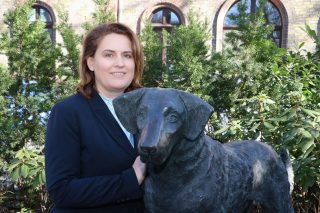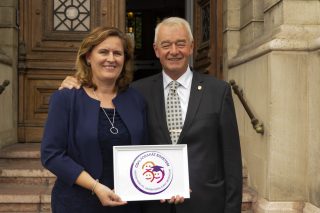What does the Alcsút Arboretum have to do with the University of Veterinary Medicine Budapest? Why does the Head of the Students’ Secretariat keep needles and threads in her desk drawer? If you read our interview with Tímea Horváthné Csapó, you’ll get the answers to these questions. Together with her family, she crosses the ridge of the Buda Mountains every day, she calls the István Street Campus her home until late afternoon, and she spends the rest of the time in the Zsámbék Basin. Here’s an excerpt from the interview.
– I was born in Székesfehérvár and grew up in a nearby village called Tabajd. I went to elementary school there, but I spent my middle school years in the neighbouring Alcsútdoboz. I am loyal to my homeland, I pay regular visits to see the area’s natural beauties. For many years, I’ve made a habit of taking a walk in the Alcsút Arboretum on the day after the graduation ceremony of veterinarians to celebrate the academic year’s most joyful event among snowdrops.
– We are ahead of ourselves a bit… When you were a child, were there any signs that you might get so close to the University of Veterinary Medicine?
 – Now that I live in the outskirts of Budapest, it’s perhaps hard to imagine, but we had lots of animals in my parents’ house. Pigeons, guinea fowls, ducks, rabbits, pigs, sheep, cattle, horses and I had a Kuvasz dog I grew up with. My father is from Békés County, he got the love of animals from there and he gave it to me as well. Even in my early childhood, I understood how important it was to take care of animals.
– Now that I live in the outskirts of Budapest, it’s perhaps hard to imagine, but we had lots of animals in my parents’ house. Pigeons, guinea fowls, ducks, rabbits, pigs, sheep, cattle, horses and I had a Kuvasz dog I grew up with. My father is from Békés County, he got the love of animals from there and he gave it to me as well. Even in my early childhood, I understood how important it was to take care of animals.
– When did you leave the Váli Valley for a longer time?
– As a high school student, I returned to Székesfehérvár, where I studied in the English-German special programme at Vasvári Pál Grammar School. In contrast with the calm and peaceful village life, I discovered student life in a bustling city. I met my future husband after graduation, and we decided to settle down in Pest County together.
– Why did you choose the teacher training college after the A-levels?
– As I mentioned, I spent my childhood in a small village, so I had this idea to teach children in the school of a similar settlement when I grow up. My dream was centred around a kind teacher, Marika Béndek, who I loved and I thought her kindness and love for children was something for me to follow. As I was able to meet certain challenges that showed I had a knack for working with children, I applied to Apor Vilmos Catholic College in Zsámbék, and I attained a degree in humanity and social studies.
– What made you leave this career?
– As a graduating college student, I was asked to coordinate the traineeships of students with teaching majors. I was also entrusted to participate in the organization of admission procedures. That’s how I got to the students’ secretariat. Hungarian higher education became my career path in 1999. At first, the Zsámbék Basin seemed to be my long-term workplace and we moved to the nearby Tök, too. However, the college’s roof structure was burnt down during a renovation project in 2003, so the institution moved to Vác in 2004. That’s how the teacher training programme, which had been launched by Christian nuns a 100 years before, ended in Zsámbék.
After the birth of my second son, I was looking for a job and I applied to the University’s advertisement. I worked together with my predecessor for a year after I was hired.
While working at the University, I attained two other degrees: I completed the specialist training course for higher education administration experts at Károli Gáspár University and, a few years ago, I graduated from Metropolitan University as a protocol consultant and event organizer.
– Your tiny office is made homely and friendly by the memorabilia from students. A gift you once got is engraved with this message: All roads lead to Timi Csapó. It still applies as we speak today. Can you summarize what your job entails?
– I think the most important thing is to support students during their studies, in terms of running the administration accurately from their enrolment to the issuance of their diploma. Our work is basically driven by the cycle of higher education, in other words, the academic year’s rhythm we all know. I am also in charge of conducting the secretarial and coordination tasks related to the University’s various Committees. My responsibilities range from applicants through beginner vets to retired veterinarians.
– Helping married students is a priority for you, too.
– Yes, my example shows that you can also marry young and raise children. Last year we won the Family-Friendly University award, which was ceremonially presented to us at the Hungarian Academy of Sciences. I’m happy that I had a little part in it, too. Walking in the corridor around 5 years ago, I noticed that the students of veterinary specialist programmes, who already had children, typically came to the school with their families. That’s when I had the idea to set up a room for mothers and babies. We bought a fridge and a microwave oven so they can heat the baby formula. Our colleagues donated baby beds, carpets, chairs and toys. The University supports students with children financially as well: ad hoc allowances amount to HUF 100 000 and a rocking horse.
was ceremonially presented to us at the Hungarian Academy of Sciences. I’m happy that I had a little part in it, too. Walking in the corridor around 5 years ago, I noticed that the students of veterinary specialist programmes, who already had children, typically came to the school with their families. That’s when I had the idea to set up a room for mothers and babies. We bought a fridge and a microwave oven so they can heat the baby formula. Our colleagues donated baby beds, carpets, chairs and toys. The University supports students with children financially as well: ad hoc allowances amount to HUF 100 000 and a rocking horse.
We also aim to participate in raising awareness for founding a family and having children. We will develop further programmes and announce new optional courses in this area.
– Who can you rely on the most at the University?
– Dr. Péter Sótonyi, who does whatever he can for students. I have rarely met a Rector with such a pro-student mindset. No matter when I call him, he never says he has no time for this now. I also get a lot of help from students implementing the Educatio exhibition and preparing for the University’s events.
– What do you like doing in your spare time?
– At the weekends, I like walking with our dog in the Nyakas Mountain. I go to Pilates classes twice a week and I’m also a member of a book club that meets on a monthly basis.
– My last question: what is your greatest dream?
– I think my job needs tolerance and empathy, so I would like to continue my service with the necessary patience and openness in the future, too. I wish for enrolled students to feel good at the University, be resilient in the pursuit of their goals, become independent and make decisions on their own, be in control of their own lives and, if possible, complete their studies within the designated time frame. If all that happens, I am the happiest person
Gusztáv Balázs
